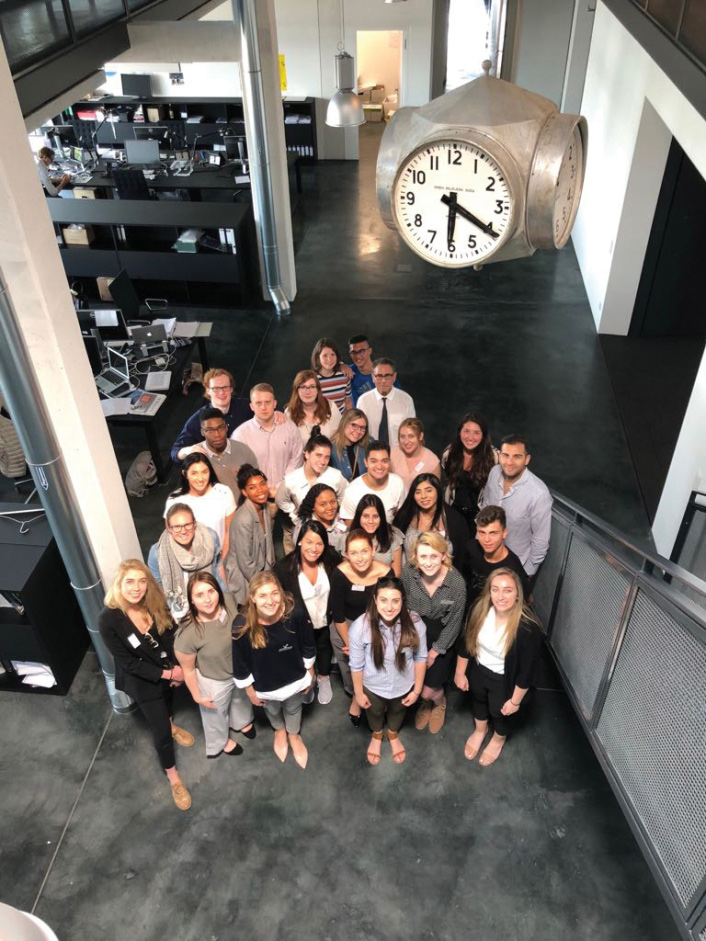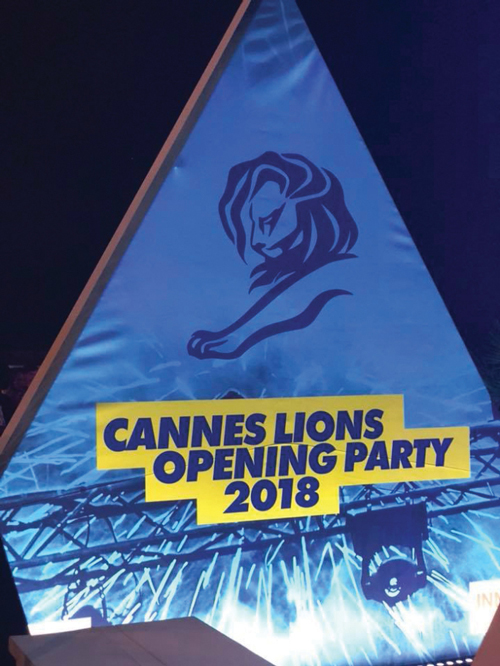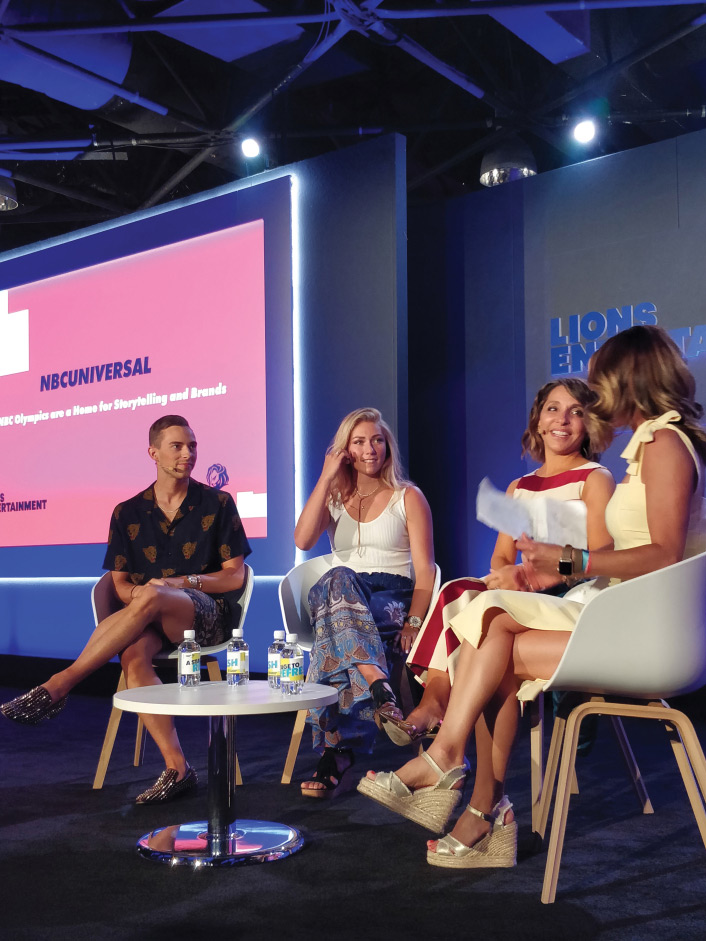 The study abroad group visiting the Avant Garde ad agency in Munich.
The study abroad group visiting the Avant Garde ad agency in Munich.Just do it. Think different. Got milk? A simple phrase, a bold advertisement or a catchy jingle can be powerful enough for a brand to become a household name and a product to sell millions.
Advertisements are everywhere: on the trains taking us to and from work, in stadiums where we watch our favorite sports teams compete, and in the print and online media we regularly read. But what if those ads contained a deeper message and prompted consumers to make a difference?
Every June, professionals in advertising, creative communications and related fields gather at the Cannes Lions Festival in France to tackle that question. Not to be confused with the more well-known Cannes Film Festival, the seven-day Cannes Lions Festival invites professionals from organizations such as Apple, Google and Twitter to discuss issues within the industry, share new and innovative messaging strategies and celebrate the year’s best in creative brand communication. A ticket to the exclusive event is highly coveted—and this year, DePaul students won a privileged place at the table.
A Perfect Fit
Conceived as a study abroad program, undergraduate and graduate students in the College of Communication traveled to the festival last summer with Juan Mundel, assistant professor of public relations and advertising, and Marshall Goldman, instructor of public relations and advertising. The students also went to Germany and the Netherlands to learn more about international advertising.
“Most of our students are already working in advertising or public relations,” Mundel explains, “so it was an opportunity to experience the festival. I thought the fit for the program was perfect to inspire them so that their work becomes better than what it already is.”

During their week at Cannes, students were able to connect with professionals from international agencies. Junior transfer student Gillian Wood described the experience as surreal. “We were kind of on the outside looking in because everyone at the festival was there with their company promoting their brand and networking with other brands and agencies,” she recalls. “We were just kind of watching it happen.”
Despite feeling like doe-eyed observers, the students were quick to jump into festival activities. On opening night, they attended a kickoff party, and during the week they mingled with professionals at events hosted by international companies that included CNN, Spotify and Facebook. While recent graduate Rabia Riaz (CMN ’17, MA ’18) enjoyed the events, it was an eye-opening experience to see how companies were using experiential advertising (an experience where the audience is able to encounter or interact with a brand) to impress agencies and form partnerships.
“Looking back at my experience at Cannes, I remember the [events] because that’s where I was actually interacting with the brand, experiencing the brand. That was a lesson all on its own,” Riaz says.
Inspiring Conversations
Students spent most of their time, however, attending a wide range of presentations on topics such as health, technology, social issues and gender equality. Industry executives and international celebrities gave many of the presentations. Sean Dunderdale recollects watching “Fashion as Cultural Influence” featuring model Naomi Campbell.
“I love what she said about changing the fashion industry,” Dunderdale says. “When she first [started modeling], designers and brands would only use white models. It’s not like that anymore. There’s a lot more diversity. If a designer doesn’t use a black model, her organization asks them to reconsider their campaign and suggests adding models of color. … Her persistence with her work and trying to push the fashion industry into a more inclusive environment for models of all genders and races was really inspiring.”
“It was also interesting to hear about [Campbell’s] experience as a female trying to be her own boss and making her own decisions,” Peter Bukowski adds. “It was awesome to hear from somebody who made it big while trying to do things the right way.”
Bukowski also recalls attending a presentation featuring survivors of the Stoneman Douglas High School shooting. “They shared their experiences and also what they’re planning to do moving forward. They have created their own nonprofits that promote antigun violence and legislation,” he says.
Cesar Camacho (CMN ’17, MA ’18) says that one of his favorite sessions featured Ukonwa Ojo, senior vice president of Cover Girl, and Issa Rae, the creator and star of HBO’s “Insecure.” Ojo spoke about the company’s recent campaign that featured women from different backgrounds, ethnicities, professions and age groups. “They wanted to capture different forms of women and what it means to be a woman,” Camacho explains. “The VP of Cover Girl said that it’s really important to represent different women in their campaigns so that younger generations can see themselves as cover girls.”
 At a festival workshop.
At a festival workshop.A starstruck Wood watched in awe as two of her favorite Olympians—Adam Rippon and Mikaela Shiffrin—spoke about developing their personal brands. “It was really interesting to hear about Olympic advertising and branding, and also how Adam and Mikaela make brand decisions about who they’re going to promote on social media,” Wood says.
Riaz was moved by “The Lion’s Share,” a presentation about animals in the entertainment industry. “Around 40 percent of all ads feature animals, yet so many species of animals are endangered and we as advertisers have a role to play [to protect them],” she explains. “It was suggested that every ad that features an animal has to pay 5 percent of its media fund to endangered animals organizations.”
Making A Difference
While the festival was the highlight of the trip, students also had memorable experiences in Munich and Amsterdam, though they didn’t have much time for sightseeing. In each city, students paired up to create complete advertising campaigns that required them to interact with locals.
“It was a really valuable experience and a great way to learn how to effectively manage time,” Dunderdale says. “In the real world, agencies give you a couple of months to create a whole campaign for a company. They have multiple people and departments working on it. We had to do all of that in a week.”
“The students realized that advertising campaigns don’t just happen out of thin air. They have to do their research, learn how to engage with audiences and be creative,” Mundel says. “They learned how to understand different cultures while also better understanding their own.”
“A lot of people think that advertising is just about selling products or a brand, but a lot of companies are becoming aware that they can make a difference,” Camacho explains. “It’s just about being able to create change by listening to people with creative ideas.”
“The study abroad trip taught me how to think outside of my own experiences,” Wood says. “Sometimes when you’re trying to come up with creative ideas, you’re limited to what you know will work. But everyone’s different. I want to look at the target market from every perspective—age groups, genders, ethnicities—and come up with something that will cater to everyone.”
“I think companies can focus on being more impactful and effective [in order] to change the world,” Bukowski says. “Rather than just making a good advertisement that’s funny or something that everyone’s going to talk about for a few months and then forget, they should create something that will inspire and stick with people.”
Mundel will continue to run the study abroad program for the next few years, with the Cannes Lions Festival being a key component of the program. “There are so many opportunities for students to go out and make a difference,” Mundel says. “I think this will help them do that.”
Also see:
Originally published in DePaul Magazine (Winter 2019).
Photos by PRAD student Libby Roth.